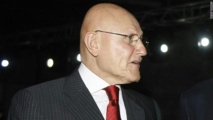
On Friday, parliamentary representatives began submitting their nominations to President Michel Sleiman, with Salam the clear favourite.
He had already been endorsed by the opposition March 14 coalition and Walid Jumblatt, the veteran kingmaker who leads Lebanon's Druze community, and on Friday key allies of the Hezbollah movement also announced their support for him.
Salam's nomination is "a chance to re-establish peace among the Lebanese," said parliamentary speaker Nabih Berri, a Shiite ally of Hezbollah.
"All the parties in Lebanon want to tamp down tensions... and wait until the situation in Syria is clearer," Hilal Khachane, a political science professor at the American University in Beirut, told AFP.
Media reports and analysts also said Saudi Arabia had pushed for Salam's nomination, seeing him as a candidate acceptable to Lebanon's opposition, and Hezbollah and its ally Syria.
"The Saudis want to avoid any disagreement between Sunnis and Shiites in Lebanon," Khachane said.
Salam's nomination would be a first step towards resolving the crisis sparked by Mikati's resignation, which came as the conflict in neighbouring Syria deepens tensions within Lebanon's multi-confessional population.
Mikati led a government dominated by the so-called March 8 coalition, made up of Iran-allied Hezbollah and its partners, who back the Syrian regime of President Bashar al-Assad against a now two-year-old revolt.
The opposition March 14 alliance backs the uprising, and despite an official Lebanese policy of "dissociation" from the conflict, both sides of the political spectrum have accused each other of interfering in the fighting.
The 128-seat Lebanese parliament includes 61 members from the Hezbollah-led coalition, with 60 seats held by the opposition.
Jumblatt, who holds seven seats, has charted a complex political path.
He is fiercely opposed to the Syrian regime, but has also stood by Hezbollah, opposing any attempt to disarm the group by force.
The opposition announced their support for Salam on Thursday, with former prime minister Fuad Siniora saying he was a "unanimous" choice because of his "national and moral engagement."
"It's a great national responsibility... I thank my brothers in the March 14 coalition," Salam said.
Jumblatt's endorsement followed shortly afterwards in an interview on Lebanese television, with him terming Salam "the voice of moderation."
Even with such broad agreement on the premier, the business of forming a government is likely to be both lengthy and fractious.
Hanging over the process is the question of whether elections will go ahead as scheduled in June, amid broad opposition to the electoral law currently on the books.
Salam, a Sunni as tradition dictates for Lebanon's prime ministers, is the son of Saib Salam, who served six terms as premier between 1952 and 1973.
Salam was first elected a Beirut MP in 1996, and re-elected in 2009. A graduate of economics and management in England and married with three children, he was culture minister between 2008 and 2009.
-----------------------------------------------------------------------------------------------------------------
He had already been endorsed by the opposition March 14 coalition and Walid Jumblatt, the veteran kingmaker who leads Lebanon's Druze community, and on Friday key allies of the Hezbollah movement also announced their support for him.
Salam's nomination is "a chance to re-establish peace among the Lebanese," said parliamentary speaker Nabih Berri, a Shiite ally of Hezbollah.
"All the parties in Lebanon want to tamp down tensions... and wait until the situation in Syria is clearer," Hilal Khachane, a political science professor at the American University in Beirut, told AFP.
Media reports and analysts also said Saudi Arabia had pushed for Salam's nomination, seeing him as a candidate acceptable to Lebanon's opposition, and Hezbollah and its ally Syria.
"The Saudis want to avoid any disagreement between Sunnis and Shiites in Lebanon," Khachane said.
Salam's nomination would be a first step towards resolving the crisis sparked by Mikati's resignation, which came as the conflict in neighbouring Syria deepens tensions within Lebanon's multi-confessional population.
Mikati led a government dominated by the so-called March 8 coalition, made up of Iran-allied Hezbollah and its partners, who back the Syrian regime of President Bashar al-Assad against a now two-year-old revolt.
The opposition March 14 alliance backs the uprising, and despite an official Lebanese policy of "dissociation" from the conflict, both sides of the political spectrum have accused each other of interfering in the fighting.
The 128-seat Lebanese parliament includes 61 members from the Hezbollah-led coalition, with 60 seats held by the opposition.
Jumblatt, who holds seven seats, has charted a complex political path.
He is fiercely opposed to the Syrian regime, but has also stood by Hezbollah, opposing any attempt to disarm the group by force.
The opposition announced their support for Salam on Thursday, with former prime minister Fuad Siniora saying he was a "unanimous" choice because of his "national and moral engagement."
"It's a great national responsibility... I thank my brothers in the March 14 coalition," Salam said.
Jumblatt's endorsement followed shortly afterwards in an interview on Lebanese television, with him terming Salam "the voice of moderation."
Even with such broad agreement on the premier, the business of forming a government is likely to be both lengthy and fractious.
Hanging over the process is the question of whether elections will go ahead as scheduled in June, amid broad opposition to the electoral law currently on the books.
Salam, a Sunni as tradition dictates for Lebanon's prime ministers, is the son of Saib Salam, who served six terms as premier between 1952 and 1973.
Salam was first elected a Beirut MP in 1996, and re-elected in 2009. A graduate of economics and management in England and married with three children, he was culture minister between 2008 and 2009.
-----------------------------------------------------------------------------------------------------------------









 Home
Home Politics
Politics









